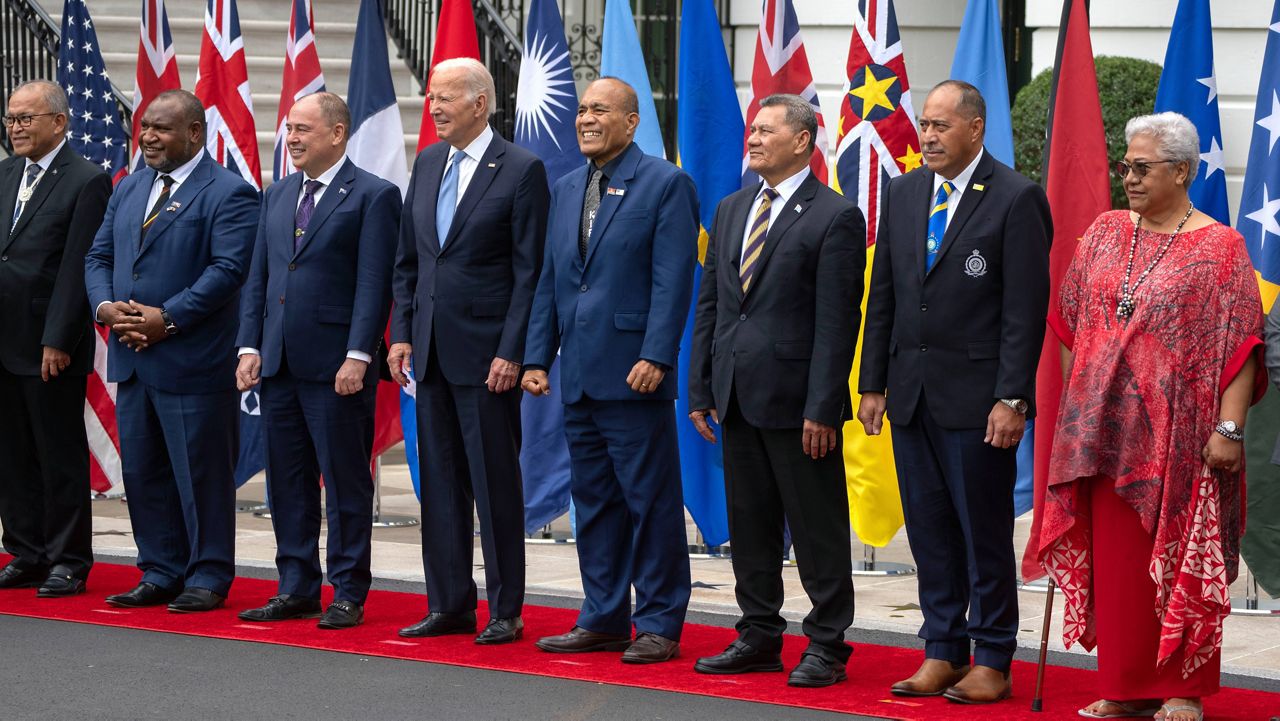Hosting Pacific islands leaders at the White House on Monday for the second U.S.-Pacific Islands Forum summit, President Joe Biden declared his dedication to ensuring the Indo-Pacific is “free, open, prosperous and secure” as the U.S. looks to step up its influence in the region.
“We're committed to working with all the nations around this table to achieve that goal,” Biden said during brief remarks at the top of Monday's meeting.
The Biden administration has looked to bolster ties in the Pacific amid rising U.S. concern about China’s growing military and economic influence.
On a call to preview the summit, a senior administration official said U.S. engagement with the Pacific islands is “not about who we are against but what we are for,” while noting there is “no question that there is some role that the PRC [People’s Republic of China] has played in all this.”
“No question that it's assertiveness and influence, including in this region, has been a factor that requires us to sustain our strategic focus,” the official added.
Monday’s meeting kicked off a two-day summit that is expected to focus largely on climate change, with Biden telling leaders present “I hear you” when it comes to such concerns.
“We hear your warnings of a rising sea, and they pose an existential threat to your nations," Biden said. "We hear your calls for reassurance that you never, never, never will lose your statehood or membership of the U.N. as a result of a climate crisis. Today, the United States is making it clear that this is our position as well.”
As part of his administration’s efforts to address that, Biden announced he is requesting Congress approve $200 million in new assistance for the region, including financing to help the islands prepare for climate and natural hazards and improve infrastructure.
Some in the region have been critical of rich countries for not doing enough to control climate change despite being responsible for much of the problem, and for profiting from loans provided to vulnerable nations to mitigate the effects.
Over the next two days, leaders attending the summit will also participate in a working lunch with Biden; meet with the president’s special envoy on climate, John Kerry; attend a dinner at the State Department hosted by Secretary of State Antony Blinken and U.N. Ambassador Linda Thomas-Greenfield; join a roundtable with Treasury Secretary Janet Yellen; and speak with members of Congress.
The U.S. is also using this year’s summit to formally establish diplomatic relations with two South Pacific nations: the Cook Islands and Niue. Prime Minister of the Cook Islands Mark Brown spoke briefly after Biden on Monday, welcoming the new level of relations between the two nations.
The 18-member Pacific Islands Forum includes Australia, the Cook Islands, Micronesia, Fiji, French Polynesia, Kiribati, Nauru, New Caledonia, New Zealand, Niue, Palau, Papua New Guinea, Republic of Marshall Islands, Samoa, Solomon Islands, Tonga, Tuvalu and Vanuatu.
The leaders of Vanuatu and the Solomon Islands are skipping the summit. A senior administration official said the U.S. was “disappointed” about the absence of the prime minister of the Solomon Islands – which has recently expanded its relations with China.
Some members of the forum were in the United States for the U.N. General Assembly in New York last week and rode on a train to Baltimore, where they attended an NFL game Sunday before visiting a U.S. Coast Guard cutter in the city’s harbor for a briefing on combating illegal fishing and other maritime issues. Biden announced Monday that later this year he will deploy a U.S. Coast Guard vessel to the region to collaborate and train with Pacific islands nations.
On Monday, Blinken was also set to take part in an event with Kiribati President Taneti Maamau as the island country signs on to a new partnership with the U.S.-backed Millennium Corporation Challenge. The group has previously assisted the country with dozens of low-lying atolls and 120,000 people to boost its workforce.
At last year’s summit, the White House unveiled its Pacific strategy, an outline of its plan to assist the region’s leaders on pressing issues such as climate change, maritime security and protecting the region from overfishing. The administration pledged the U.S. would add $810 million in new aid for Pacific islands nations over the next decade, including $130 million on efforts to stymie the impacts of climate change.
Biden earlier this year had to cut short a planned visit to the Indo-Pacific, scrapping what was to be a historic stop in Papua New Guinea, as well as a visit to Australia for a gathering with fellow leaders of the so-called Quad partnership so he could focus on debt limit talks in Washington. He would have been the first sitting U.S. president to visit Papua New Guinea.
Biden is set to honor Australian Prime Minister Anthony Albanese with a state visit next month.
The Associated Press contributed to this report.



